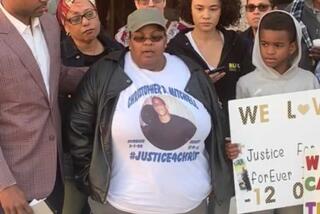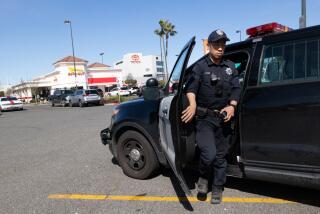Court: Hold Cops Liable for Pursuits
- Share via
A state appeals court has taken the unusual step of urging lawmakers to change laws that give police officers broad protections against liability in high-speed chases, saying cops should be held more accountable for their actions.
The 4th District Court of Appeal issued its challenge in a stinging opinion involving a Westminster police officer who chased a stolen car through a high school campus in 1995. The suspect’s car slammed into a dumpster, which struck an innocent bystander who was collecting recyclables, gravely injuring him.
The justices said the existing law, considered the nation’s most protective, amounts to a “get-out-of-liability-free card” for police officers regardless of whether they act recklessly during chases. The law also leaves victims no form of redress, they said.
“We urge the Legislature to revisit this statute and seriously reconsider the balance between public entity immunity and public safety. The balance appears to have shifted too far toward immunity,” the court stated in its opinion published earlier this month.
The ruling comes amid growing scrutiny of police chases, which according to federal statistics have killed 541 people in the last 10 years across California.
Of those victims, 181 were either pedestrians or innocent occupants of cars that crossed paths with cruisers or getaway cars.
In the most recent high-profile case earlier this month, a 3-week-old Los Angeles boy lost his left arm when a man fleeing the scene of a stabbing sped through a red light and crashed into the sport utility vehicle the baby was riding in.
Under existing law, officers do not have to prove they were following a formal pursuit policy when a suspect’s car crashes and causes harm. Rather, all they have to do is show the department had an adequate policy in place. Officers can be held liable if their vehicle hits a bystander.
As a result, the justices said they had no choice but to rule against the family of the man hit during the Westminster chase, even though justices believed the police officer acted improperly.
Advocates who have long been pushing to rewrite the rules said they are buoyed by the court’s commentary, describing it as the strongest argument to date in their fight to get the statute overturned.
State lawmakers are not obligated to take up the matter, and it is not immediately clear if they will.
Either way, even some law enforcement officials said the ruling should force police departments to reexamine their chase policies and consider ways to reduce the risks to bystanders.
“A decision like this, or the comments surrounding the decision, is a good heads-up that departments need to pay attention,” said Newport Beach Police Chief Bob McDonell, president of the California Police Chiefs Assn.
The statute in question, known formally as 17004.7 of the motor vehicle code, shields police officers from liability in chases to a far greater degree than similar laws in other states, experts said.
“California has taken it to an extreme,” said Geoffrey Alpert, a criminology professor at the University of South Carolina who is considered among the nation’s top authorities on the issue.
The law was actually a compromise reached 15 years ago between the California State Trial Lawyers Assn. and a coalition of 160 government agencies, insurers, doctors and nonprofit groups such as the Boy Scouts and Girl Scouts.
Citing rising insurance costs, the coalition was considering a statewide ballot measure that would extend strict limits on all types of liability claims, said Browne Greene, a Los Angeles attorney who was president of the association at the time.
At the time, most police departments did not have pursuit policies in place. So the trial lawyers agreed to support immunity for those departments that created polices, Greene said. As part of the compromise, the parties agreed to extend the period of time in which victims could file lawsuits against government agencies from 100 days to six months.
After the law was adopted, police departments across the state established chase policies. But Greene now believes the law has proven to be flawed.
“I don’t think the idea of establishing policies has done anything. You’ve seen an ever-increasing set of carnage, murder and mayhem caused by these police chases,” he said.
Other lawyers who have handled such cases agree that the recent ruling could be pivotal in getting the statute overturned.
“This may very well be a watershed moment,” said Carole A. Watson, a Los Angeles civil rights attorney who said her firm stopped taking such cases a long time ago “because you just can’t win them.”
But police officials and their lawyers maintain that public safety will be in greater jeopardy if police are second-guessed about every chase.
“Clearly, if they open up liability for all pursuits, that will have a chilling effect on whether or not to allow the crook to run, and essentially give them good reason to. That’s the danger,” said McDonell, the Newport Beach chief.
“It’s a delicate balance of not being able to pursue criminals and weighing the risks of pursuing them.”
McDonell said most departments have adequate policies and review measures in place, so that if protocols are not followed, officers are punished with actions ranging from written reprimand to firing.
The suit in Westminster was brought by the family of Khuong Van Nguyen, who was seriously brain-damaged in the accident and spent three years in a hospital until he died, leaving behind a wife and three children.
His family is preparing to appeal the 4th District’s ruling to the California Supreme Court.
The state’s highest court has already upheld the statute, ruling in 1999 that an officer who gives chase without activating a siren or red light is still fully protected from liability. But the family’s Los Angeles attorney, John Taylor, said he hopes the appellate court’s attack will encourage state justices to take another look at the law.
“We’re hopeful that the California Supreme Court would take a look at this very pressing issue,” Taylor said. “I think that the frustrations that the [4th District] court expressed in their opinion is an invitation for the Supreme Court to do something that the Legislature hasn’t done yet.”
More to Read
Get the L.A. Times Politics newsletter
Deeply reported insights into legislation, politics and policy from Sacramento, Washington and beyond. In your inbox twice per week.
You may occasionally receive promotional content from the Los Angeles Times.










